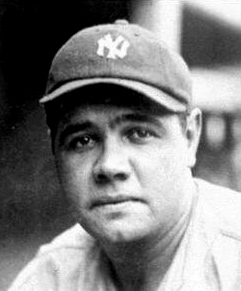George Herman "Babe" Ruth Jr. was an American professional baseball player whose career in Major League Baseball spanned 22 seasons, from 1914 through 1935. Nicknamed "The Bambino" and "The Sultan of Swat", he began his MLB career as a star left-handed pitcher for the Boston Red Sox, but achieved his greatest fame as a slugging outfielder for the New York Yankees. Ruth established many MLB batting records, including career home runs , runs batted in , bases on balls , slugging percentage , and on-base plus slugging ; the last two still stand as of 2019. Ruth is regarded as one of the greatest sports heroes in American culture and is considered by many to be the greatest baseball player of all time. In 1936, Ruth was elected into the Baseball Hall of Fame as one of its "first five" inaugural members.
At age seven, Ruth was sent to St. Mary's Industrial School for Boys, a reformatory where he was mentored by Brother Matthias Boutlier of the Xaverian Brothers, the school's disciplinarian and a capable baseball player. In 1914, Ruth was signed to play minor-league baseball for the Baltimore Orioles but was soon sold to the Red Sox. By 1916, he had built a reputation as an outstanding pitcher who sometimes hit long home runs, a feat unusual for any player in the pre-1920 dead-ball era. Although Ruth twice won 23 games in a season as a pitcher and was a member of three World Series championship teams with the Red Sox, he wanted to play every day and was allowed to convert to an outfielder. With regular playing time, he broke the MLB single-season home run record in 1919.
After that season, Red Sox owner Harry Frazee sold Ruth to the Yankees amid controversy. The trade fueled Boston's subsequent 86-year championship drought and popularized the "Curse of the Bambino" superstition. In his 15 years with the Yankees, Ruth helped the team win seven American League pennants and four World Series championships. His big swing led to escalating home run totals that not only drew fans to the ballpark and boosted the sport's popularity but also helped usher in baseball's live-ball era, which evolved from a low-scoring game of strategy to a sport where the home run was a major factor. As part of the Yankees' vaunted "Murderers' Row" lineup of 1927, Ruth hit 60 home runs, which extended his MLB single-season record by a single home run. Ruth's last season with the Yankees was 1934; he retired from the game the following year, after a short stint with the Boston Braves. During his career, Ruth led the AL in home runs during a season 12 times.
During Ruth's career, he was the target of intense press and public attention for his baseball exploits and off-field penchants for drinking and womanizing. After his retirement as a player, he was denied the opportunity to manage a major league club, most likely due to poor behavior during parts of his playing career. In his final years, Ruth made many public appearances, especially in support of American efforts in World War II. In 1946, he became ill with nasopharyngeal cancer and died from the disease two years later. Ruth remains a part of American culture, and in 2018 President Donald Trump posthumously awarded him the Presidential Medal of Freedom.
Wikipedia
✵
6. February 1895 – 16. August 1948
